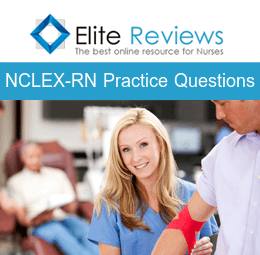NCLEX Myasthenia Gravis
NCLEX Myasthenia Gravis
Myasthenia gravis (MG) is a neuromuscular disease that leads to fluctuating muscle weakness and fatigue. In the most common cases, muscle weakness is caused by circulating antibodies that block nicotinic acetylcholine receptors at the post-synaptic neuromuscular junction. By blocking the ability of the neurotransmitter acetylcholine to bind to these receptors in the muscle, these antibodies keep motor neurons from signaling the muscle to contract. Alternatively, in a much rarer form, muscle weakness is caused by a genetic defect in some portion of the neuromuscular junction that is inherited at birth as opposed to developing through passive transmission from the mother’s immune system at birth or through autoimmunity later in life.
Myasthenia gravis is believed to be caused by variations in certain genes. The disorder occurs when the immune system malfunctions and attacks the body’s tissues. The antibody in myasthenia gravis attacks normal human protein, targeting a protein called an acetylcholine receptor, or a related protein called a muscle-specific kinase.
Human leukocyte antigens have been associated with MG susceptibility. Many of these genes are present among other autoimmune diseases. Relatives of MG patients have a higher percentage of other immune disorders.
The thymus gland cells form part of the body’s immune system. In those with myasthenia gravis, the thymus gland is large and abnormal. It sometimes contains clusters of immune cells which indicate lymphoid hyperplasia, and it is believed the thymus gland may give wrong instructions to immune cells
Signs and Symptoms
Muscle weakness caused by myasthenia gravis worsens as the affected muscle is used repeatedly. Because symptoms usually improve with rest, your muscle weakness may come and go. However, myasthenia gravis symptoms tend to progress over time, usually reaching their worst within a few years after the onset of the disease.
Eye muscles
In more than half the people who develop myasthenia gravis, their first signs and symptoms involve eye problems, such as:
- Drooping of one or both eyelids (ptosis).
- Double vision (diplopia), which may be horizontal or vertical, and improves or resolves when one eye is closed.
Face and throat muscles
In about 15 percent of people with myasthenia gravis, the first symptoms involve face and throat muscles, which can cause:
- Altered speaking. Your speech may sound very soft or nasal, depending upon which muscles have been affected.
- Difficulty swallowing. You may choke very easily, which makes it difficult to eat, drink or take pills. In some cases, liquids you’re trying to swallow may come out your nose.
- Problems chewing. The muscles used for chewing may wear out halfway through a meal, particularly if you’ve been eating something hard to chew, such as steak.
- Limited facial expressions. Your family members may comment that you’ve “lost your smile” if the muscles that control your facial expressions have been affected.
Neck and limb muscles
Myasthenia gravis can cause weakness in your neck, arms and legs, but this usually happens along with muscle weakness in other parts of your body, such as your eyes, face or throat.
The disorder usually affects arms more often than legs. However, if it affects your legs, you may waddle when you walk. If your neck is weak, it may be hard to hold up your head.
Causes
This neuromuscular disease is caused by transmission defects in nerve impulses to muscles. The neuromuscular junction is apparently affected: acetylcholine, which produces muscle contraction under normal conditions no longer produces the contractions necessary to muscle movement.[
Treatments
Treatment is by medication and/or surgery. Medication consists mainly of acetylcholinesterase inhibitors to directly improve muscle function and immunosuppressant drugs to reduce the autoimmune process. Thymectomy is a surgical method to treat MG.
Medications
- Cholinesterase inhibitors
- Corticosteroids
- Immunosuppressants
Intravenous therapy
- Plasmapheresis
- Intravenous immunoglobulin (IVIG).
- Monoclonal antibody
NCLEX National Exam Courses
Overview
- Elite Reviews Offers A Variety Of Online Courses That Will More Than Adequately Help Prepare The Graduate Nurse To Pass The National Exam.
- Each Course Includes Sample Questions & The Most Current NCLEX Exam Updates.
NCLEX Free Trial
- FREE Sample Lecture & Practice Questions
- Available For 24 Hrs After Registration
- Click The Free Trial Link To Get Started – NCLEX Free Trial
How It Works
How The Course Works
- First – Purchase The Course By Clicking On The Blue Add To Cart Button – You Will Then Be Prompted To Create A User Account.
- Second – After Creating An Account, All 3 Options (90, 120, 150 Days) Will Be Listed. Select The Option You Desire And Delete The Other Two.
- Third – You Will Be Prompted To Pay For This Review Using PayPal – After Payment You Will Be Redirected Back To Your Account.
- Last – Click The Start Button Located Within Your Account To Begin The Course
- 175 Prep Questions
- Q & A With Rationales
- Alt. Format Questions
- 90 Days Availability
- Cost $75.00
- 1250+ Prep Questions
- Q & A With Rationales
- Alt. Format Questions
- 90 Days Availability
- Cost $200.00
NCLEX Practice Questions Bundle
- 1350+ Prep Questions
- Q & A With Rationales
- Alt. Format Questions
- 90 Days Availability
- Cost $225.00
NCLEX Review Course
- Option 1
- Lectures & 1250+ Questions
- Q & A With Rationales
- Alt. Format Questions
- 90 Days Availability
- Cost $275.00
- Option 2
- Lectures & 2000+ Questions
- Q & A With Rationales
- Alt. Format Questions
- 90 Days Availability
- Cost $325.00
NCLEX Review Course Bundle
- Option 3
- Lectures & 3000+ Questions
- Q & A With Rationales
- Alt. Format Questions
- 90 Days Availability
- Cost $375.00






